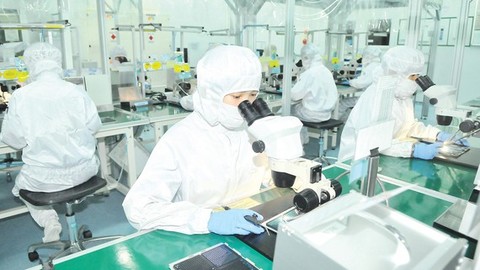
Electronic component production at the Japanese-owned MTEX Company in HCM City. — Photo sggp.org.vn
Vietnamese companies need to meet the requirements of foreign firms if they want to participate in global supply chains from mid-2021 when the Covid-19 pandemic is expected to be under control, experts said.
The difficult situation caused by the pandemic in the EU, the US and many other parts of the world is expected to worsen the disruption in the global supply chains of raw materials for production.
However the pandemic is also creating new business models, bringing opportunities for the establishment of new value chains as Viet Nam attracts a wave of investments shifting from other countries.
The number of Vietnamese enterprises that have become tier-1 suppliers for Samsung Electronics Vietnam has increased to 42 now from four in 2014, and is expected to reach 50 by the end of this year.
Jang Yoon Ho, director of Partner Support - Samsung Electronics Viet Nam, said his company was willing to provide technical support to Vietnamese enterprises seeking to join the supply chain, thus enabling Viet Nam’s supporting industries to improve.
The company plans to expand production further in Viet Nam, according to the director.
It has six plants producing mobile phones, electrical and electronic products, television sets, and home appliances, and plans to open a product research and development centre in Ha Noi by the end of this year.
It makes three million mobile phones a year, and accounts for 50 per cent of the group’s global mobile phone exports.
A recent study by the Japan External Trade Organisation (JETRO) found that demand for supporting industry products from foreign-invested enterprises in Viet Nam is set to rise, including from Japanese firms, which are expected to invest heavily in Viet Nam next year.
“As many as 15 out of 30 Japanese firms with overseas production bases said they want to expand and diversify their supply sources in Viet Nam,” it said.
Shimizu Akira, chief representative of the Japan International Cooperation Agency in Viet Nam, said many Japanese enterprises expected to enter Viet Nam as part of their plans to expand and diversify their supply chain.
To grab the opportunities arising from the wave of investments, Viet Nam needs to offer unencumbered lands in industrial and economic zones along with attractive land policies and good infrastructure, according to Akira.
Viet Nam also needs to improve its investment climate and quality of human resources to meet the requirements of foreign investors.
The process will require close co-ordination between the Government, localities and industries to create conducive policies and improve the business climate.
Le Bich Loan, deputy head of the Saigon Hi-tech Park management, said the management had worked with Long An, Binh Duong, Dong Nai, and Ba Ria - Vung Tau provinces to develop a network of supporting industries, she said.
The provinces would work to improve production capacity of the local enterprises, she added.
The HCM City Export Processing and Industrial Zones Authority (HEPZA) is now working on a demand from foreign enterprises that local firms need to guarantee delivery in time.
The city also plans to expand some industrial zones near the Saigon Hi-tech Park like the Binh Chieu and Linh Trung industrial parks and the Tan Thuan Export Processing Zone.
More high-rise factories are also being built to meet the needs of supporting industries, according to HEPZA.
The Tan Thuan Export Processing Zone is expected to open a three-storey factory with a floor area of 18,000sq.m and a two-storey factory with a floor area of 5,094sq.m at the Binh Chieu Industrial Park by the end of this year.
After 2020 the Binh Chieu Industrial Park is expected to build an eight-storey plant with a floor area of 177,000sq.m.
Viet Nam had emerged as one of the top locations in Southeast Asia for foreign investors looking to relocate or supplement their China operations, experts said.
They attributed it to the stable political and business environment, low wages and a growing economy despite the outbreak. — VNS